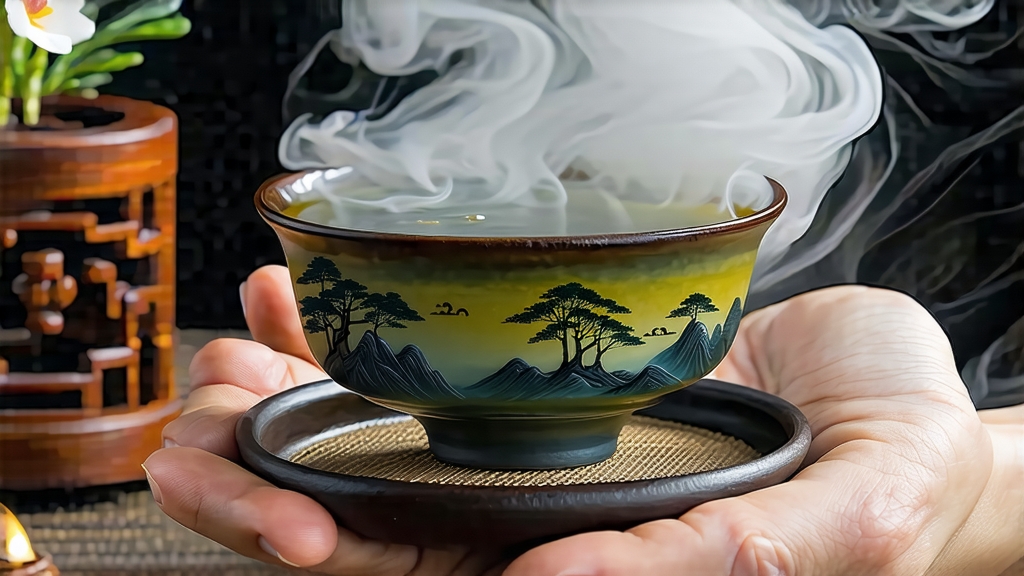
If green tea is the gentle whisper of spring and pu-erh the basso profundo of autumn, then Phoenix Dancong—Fenghuang Dancong in Mandarin—must be the mountain aria of southern China. Hailing from the vertiginous granite peaks of Fenghuang Shan in Guangdong Province, this oolong family is celebrated for one remarkable trait: each old-garden bush can yield a liquor that uncannily mimics the scent of a specific flower or fruit—honeysuckle, gardenia, almond, even ripe mango—without ever touching a single petal or peel. To understand how a leaf becomes a symphony, one must travel 900 metres above the South China Sea, where clouds brush the crowns of 300-year-old tea trees and the air is thick with the resin of wild orchids and the distant echo of Chaozhou opera.
A Brief, Leaf-Stained History
The story begins during the Song dynasty, when ancestors of the She ethnic minority transplanted wild Camellia sinensis from the surrounding forests onto terraced basaltic soils. By the Ming, local gazetteers record “bird-beak” leaves being pressed into tribute cakes for the imperial court. The name Dancong—literally “single bush”—was formalised in the late Qing, when tea farmers noticed that one particular tree produced a nectar-like infusion. Rather than blending its leaves with neighbours, they harvested that bush alone, giving birth to the practice of “single-tree vinification” centuries before the wine world coined the term “single-vineyard.” When British clipper ships reached Canton in the 1840s, Dancong sailed to London salons under the poetic label “Chinese Bouquet Tea,” fetching prices higher than first-flush Darjeeling.
The Many Faces of a Single Name
Today “Phoenix Dancong” functions like “Burgundy” in France: an umbrella for scores of aromatic profiles tied to micro-gardens. Roughly 80 recognised cultivars survive, grouped by fragrance type. Among the most coveted are:
• Huangzhi Xiang (Orange Blossom Fragrance) – bright citrus top notes over a creamy body.
• Milan Xiang (Honey Orchid) – a velvety texture laced with lychee and lavender.
• Zhilan Xiang (Gardenia) – greenish liquor, high-pitched floral bouquet.
• Tongtian Xiang (Heaven-Piercing) – grown at 1,100 m, it releases a cooling menthol finish said to “reach the sky.”
• Yashu Xiang (Duck Shit) – named provocatively to deter thieves; it delivers a paradox of roasted sugarcane and wild lily.
Each cultivar is propagated by cuttings to preserve its aromatic code, yet even cloned bushes will sing in different keys depending on altitude, soil mineral load, and the charcoal master’s intuition.
From Leaf to Song: The Craft
Harvest arrives in late April, when two leaves and a bud swell to the width of a sparrow’s tongue. Pickers climb stone staircases older than their great-grandparents, wicker baskets strapped fore and aft, moving through groves so steep that mists condense and drip from their hat brims. By noon the leaf is withered on bamboo racks set inside mountain caves where diurnal temperature swings 15 °C, oxidising the edges while keeping the veins jade-green.
The critical act is shaking: 90 minutes of gentle tossing in reed-woven sieves that bruise epidermis just enough to liberate enzymes. Oxidation proceeds in pulses—10 minutes of rest, 30 seconds of scent evaluation—until the leaf emits a metallic ring reminiscent of blood-orange zest. At 50 % oxidation, firing halts the process in a 200 °C wok, hands moving faster than a croupier’s to prevent scorch.
What follows is the signature charcoal bake. Using 20-year-old lychee wood, the tea maker fills a waist-high clay oven, covering embers with a 5 cm ash blanket that radiates steady infrared heat. Over two consecutive nights the leaf is laid in linen-lined bamboo baskets, turned every 20 minutes, absorbing a whisper of smoke while its internal sugars transform into caramelised esters. Between bakes the tea “sleeps” in reed cylinders, allowing moisture to migrate from stem to leaf, homogenising flavour. A finished batch may lose 60 % of its weight yet gain decades